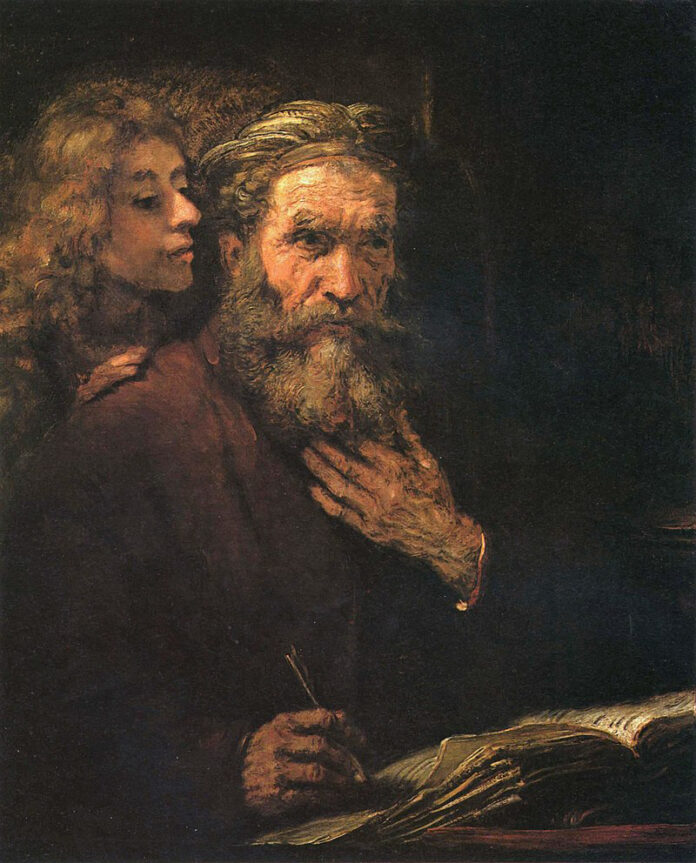
The Apostle Matthew is distinctive not only because his Gospel begins the New Testament with Jesus Christ’s genealogy going back to Abraham and King David but also because he had been a tax collector and was despised by his fellow Jews for his venality and implied allegiance to the Roman Empire.
The Rev. Jay Armstrong, Mormon leader Chris Vore and the Revs. Christopher Redden and Dare Stevens say Matthew is also notable because his Gospel is the only one of the four with an account of the Sermon on the Mount.
“Matthew seems to speak more to the Jewish people in his Gospel with all those images and teachings from the Old Testament, connecting back to Jesus’s Jewish roots and what God was doing with him,” said the Rev. Armstrong, pastor of the First United Methodist Church. “There must have been some kind of reconciliation from the work he had done before.”
Speaking Hebrew, Aramaic and Greek, Armstrong said, Matthew “must have been a learned guy, having gone to some of the religion schools.
“I don’t know if he’d been a crook, but Zacchaeus (another tax collector who followed Jesus as detailed in Luke 19:1-10) was,” the pastor said. “The tax collectors took more than what was reasonable, which was why they took that job. It was an opportunity to enrich yourself with worldly goods; but Matthew enriches himself in another way when Jesus talks about storing up your treasures in Heaven.
“Matthew gives up his treasures on earth for a treasure he can take into eternity.”
Not much else is told in the New Testament about the apostle, who was originally called “Levi,” but Armstrong said he undoubtedly left Jerusalem with the other apostles to spread the Gospel around the known world. “He might have ended up in Ethiopia because there was a community of Jews there for him to talk with, going back to Solomon and the Queen of Sheba,” he said.
Vore, president of the Odessa Stake of the Church of Jesus Christ of Latter-day Saints, said the apostle exemplifies the principle that redemption is available to anyone who repents. “The calling of Matthew by Jesus and Matthew’s willingness to follow him is a testament that God loves all his children, even the most hated and despised in society, and that any of us, no matter where we are or what we have done, can choose to follow the Savior and be redeemed,” he said.
The Rev. Redden said Matthew “was a gentle person who followed Jesus with all his heart.
“He saw the human aspect of who Jesus was, so his writings reflect the human interaction that Jesus had with people,” said Redden, formerly of St. Matthew’s Baptist Church and now pastor of Greater New Hope Baptist Church in Texarkana. “I like the Gospel of Matthew for its availability, reliability and simplicity. It’s most famous for the Sermon on the Mount, in which Jesus inspired the people about what they were going through.
“I don’t know if Matthew saw the crucifixion, but he was there for the ascension. The apostles went all over the world, knowing they would be persecuted in some form or fashion and could be killed. They went and did it anyway.”
Scholars believe Matthew began his ministry in Judea, the region south of Jerusalem, and went to Persia and Ethiopia, where he might have been martyred, although history is unclear about the manner of his death.
The Rev. Stevens, pastor of the First United Methodist Church in Crane, said Matthew “could have been one of the older apostles, possibly at some point a sympathizer with the Roman Empire, which would have put him at odds with most of the other disciples.
“We don’t know who changed his name, although ‘Matthew’ would have been the Greek for ‘Levi,’ which is Hebrew,” Stevens said. “There’s a lot of speculation about what kind of man he was, but he would have felt very privileged to be asked by a rabbi (Jesus) to become a follower because rabbis and their students were the cream of Jewish society.”
The pastor said Matthew “started dealing with this radical fringe rabbi who was looked on as seditious toward the Roman Empire.
“Jesus was bringing in people from Galilee who were wanting rebellion, but of course he was planning a different type of rebellion,” Stevens said. “There was always somebody being touted as the messiah who would gather followers and go into the desert and then the Romans would gather a legion and go out and kill them.
“So saying you were the messiah was almost a death sentence for you and any disciples who followed you. Following a radical rabbi was really putting your life on the line.”



